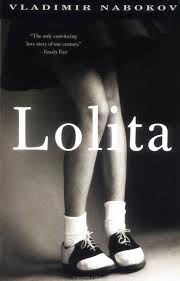Our book group choice for July 2004 is Lolita by Vladimir Nabokov. The novel is narrated by Humbert Humbert, a middle-aged literature professor who becomes obsessed with Dolores Haze, a 12-year-old girl whom he nicknames “Lolita.” Humbert recounts his relationship with Lolita, beginning with his first encounter with her and her mother, Charlotte Haze, and ending with Lolita’s escape from him.
The novel is divided into three parts. In the first part, Humbert recounts his childhood and his first encounter with Lolita. He tells of his love for nymphets, or prepubescent girls, and how he was traumatized by the death of his first love, Annabel Leigh. Humbert then describes his marriage to Charlotte Haze, which he only entered into in order to be near Lolita.
In the second part, Humbert takes Lolita on a cross-country road trip. During the trip, Humbert and Lolita engage in a sexual relationship. Humbert describes their relationship in graphic detail, but he also shows the psychological toll that it takes on both of them.
In the third part, Lolita escapes from Humbert and runs away with a carny named Clare Quilty. Humbert tracks down Lolita and Quilty, and he kills Quilty in a fit of rage. Lolita then returns to Humbert, but their relationship is never the same.
Lolita is a controversial novel, but it is also a literary masterpiece. Nabokov’s writing is exquisite, and he creates a complex and sympathetic portrait of Humbert Humbert. It is a meditation on love, obsession, and the nature of childhood.
Discussion Questions
- The language of the ‘confession’ is striking, filled with French expressions, puns in several other languages, and allusions to authors from Petrarch to Joyce. How does this approach affect our interpretation of the book? Does it obfuscate as much as reveal?
- Humbert attributes his pedophilia (or “nympholepsy”) to his tragically aborted childhood romance with Annabel Leigh. How far can we trust this explanation? How do we reconcile Humbert’s reliance on the Freudian theory of psychic trauma with his corrosive disdain for psychiatrists?
- Is Humbert a prisoner of the past? Does he ever succeed in escaping it?
- How does Humbert’s marriage to Valeria foreshadow his relationships with both Charlotte and Lolita? How does the revelation of Valeria’s infidelity prepare us for Lolita’s elopement with Quilty? Why does Humbert respond so differently to these betrayals?
- Is Humbert’s madness an aspect of his sexual deviance or is it something more fundamental? Can we trust a story told by an insane narrator?
- What makes Charlotte Haze so repugnant to Humbert? Does the author appear to share Humbert’s antagonism?
- To describe Lolita and other alluring young girls, Humbert coins the word “nymphet.” How does the character of Lolita combine mythology and entomology? In what ways does Lolita resemble both an elf and an insect? What are some of this novel’s themes of enchantment and metamorphosis as they apply both to Lolita and Humbert, and perhaps to the reader as well?
- Can Humbert ever be said to “love” Lolita? Does he ever perceive her as a separate being? Is the reader ever permitted to see her in ways that Humbert cannot?
- Do you accept Humbert’s assertion that Lolita initiates their first sexual encounter, seducing him after he has balked at violating her in her sleep?
- What is the true nature of the crimes committed against Lolita? Does Humbert ever genuinely repent them, or is even his remorse a sham? Does Lolita forgive Humbert or only forget him?
- Humbert is not only Lolita’s debaucher but her stepfather and, after Charlotte’s death, the closest thing she has to a parent. What kind of parent is he? How does his behavior toward the girl increasingly come to resemble Charlotte’s? Why, during their last meeting, does Lolita dismiss the erotic aspect of their relationship and “grant” only that Humbert was a good father?
- The last lines of Lolita are: “I am thinking of aurochs and angels, the secret of durable pigments, prophetic sonnets, the refuge of art. And this is the only immortality you and I may share, my Lolita” [p. 309]. What is the meaning of this passage? What does art offer Humbert and his beloved that sexual passion cannot? Is this aesthetic appeal merely the mask with which Humbert conceals or justifies his perversion, or is the immortality of art the thing that Humbert and his creator have been seeking all along? In what ways is Lolita at once a meditation on, and a re-creation of, the artistic process?

